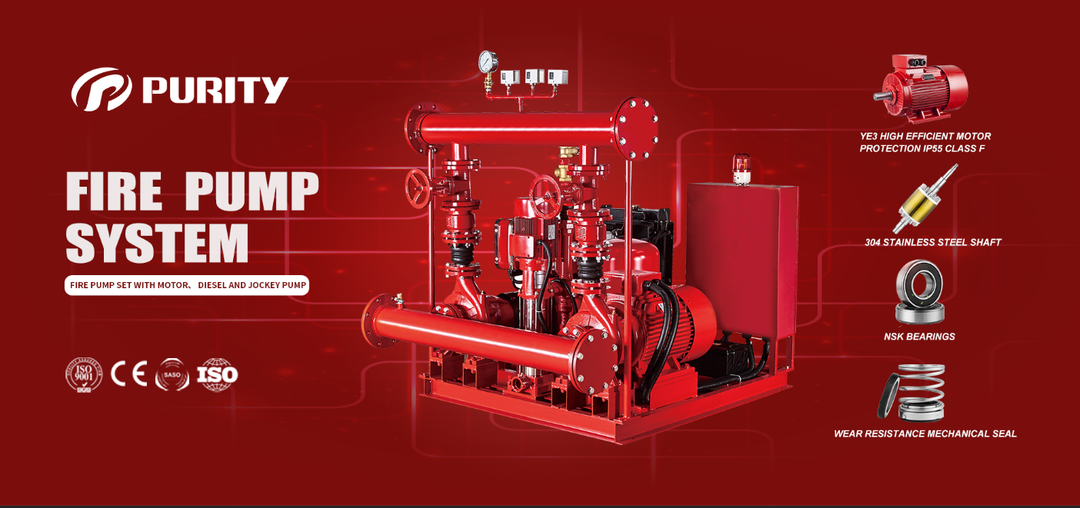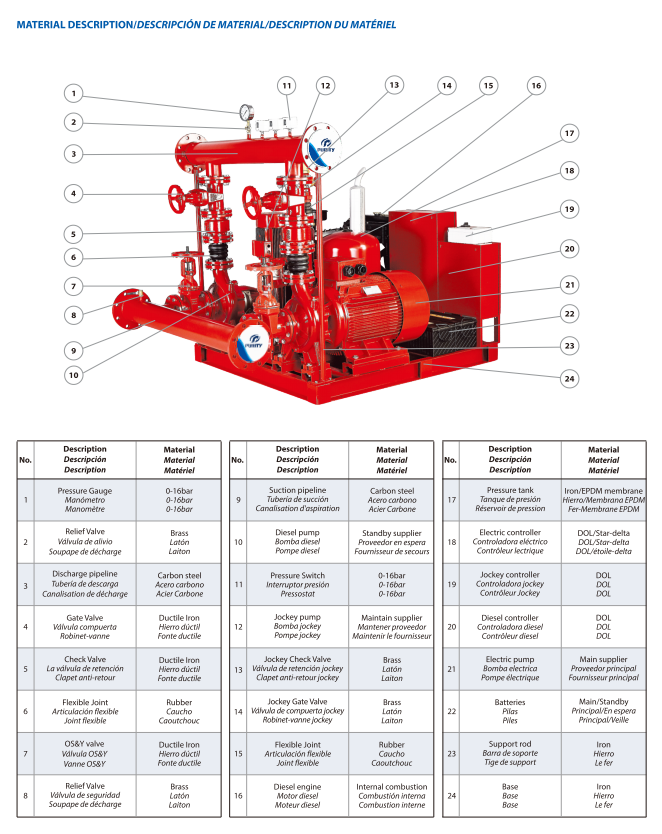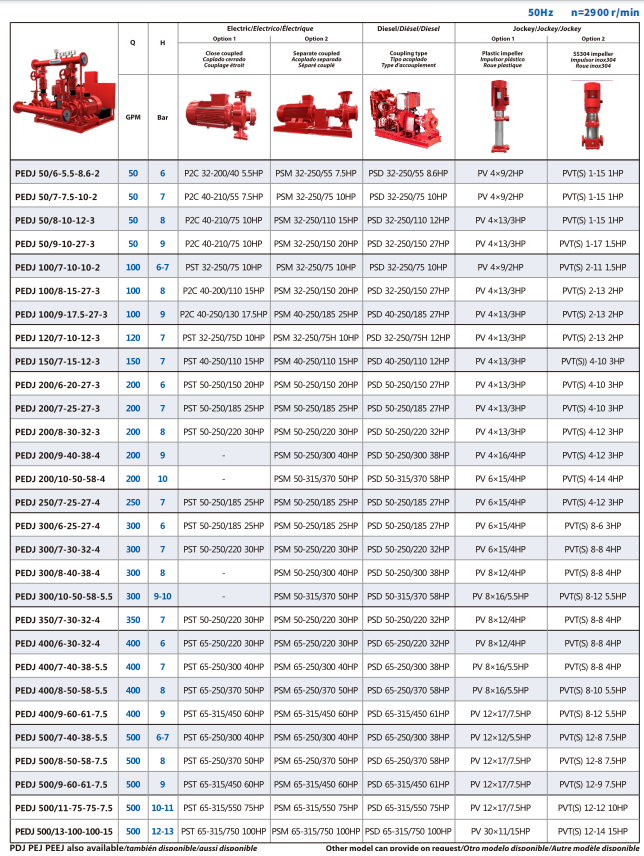Diesel engine-driven fire pump systems are reliable and efficient solutions for fire protection, especially in areas where electrical power supply is unreliable or insufficient. Understanding how these systems work, as well as their unique design requirements, is crucial for ensuring their effectiveness in emergency situations. This article will explore the working principles of diesel engines, the key considerations in designing diesel engine fire pumps, and the advantages of using such systems.

Figure | Purity PEDJ Diesel Fire Pump
A diesel engine operates through four distinct strokes: intake, compression, power (combustion), and exhaust. During the intake stroke, pure air is drawn into the cylinder. Unlike gasoline engines, which mix fuel and air before compression, diesel engines compress only air. The compression process is critical, as it raises the temperature and pressure within the cylinder to extremely high levels. Typically, the cylinder's pressure reaches 3.5–4.5 MPa, and the temperature rises to 750–1000K at the end of the compression stroke.
As the piston nears the top of its compression stroke, fuel is injected into the highly compressed and heated air in the cylinder. Diesel fuel has a lower evaporation rate than gasoline but a much lower auto-ignition temperature. When the fuel mixes with the compressed air, it spontaneously ignites, creating an explosion that forces the piston downward in the power stroke, turning the crankshaft and generating mechanical power. This high-efficiency combustion process is the core mechanism behind a diesel engine's ability to deliver powerful, sustained energy.
While the basic working principles of diesel engines remain consistent across different applications, diesel fire pump systems have specific design requirements. Fire pumps must be designed and installed with attention to several critical factors, including fuel supply, air intake, exhaust management, environmental conditions, and engine cooling.
First, fuel supply must be reliable and consistent. Diesel fire pumps typically use No. 2 diesel fuel, which must meet strict quality standards to ensure proper engine function. NFPA 20, the standard governing fire pump installation, mandates that fuel tanks be regularly monitored to avoid fuel degradation. Ensuring a constant supply of clean fuel is essential to prevent engine failure during critical operations.
Second,air intake and exhaust systems play a crucial role in diesel engine performance. Diesel engines require large amounts of clean air to facilitate combustion, and the exhaust system must be designed to safely expel the combustion gases. Improper exhaust system design can lead to backpressure, which reduces the engine's efficiency and may cause damage over time. To prevent overheating, exhaust pipes must be properly insulated, and the system should be kept as short as possible.
Third, the environmental conditions of the pump room must be carefully managed. Diesel engines operate best within a specific temperature range. The ambient temperature should remain between 40°F and 120°F. Block heaters are often installed to maintain engine readiness, and these must be connected to a reliable power source to ensure functionality in all weather conditions.

Figure | Purity PEDJ Diesel Fire Pump Parts
Proper fuel management is essential for diesel fire pumps. Diesel fuel is subject to aging and degradation, so regular testing and maintenance of the fuel system are required to ensure its reliability. Fuel tanks must be large enough to sustain pump operation during an emergency but not so large that the fuel remains unused for extended periods, which can lead to quality issues.
Cooling is another critical aspect of diesel engine fire pump design. Most diesel fire pumps use water cooling systems, where water from the fire pump’s discharge line is circulated through a heat exchanger to absorb the engine’s heat. Water is a far more effective cooling medium than air, allowing for more compact and efficient cooling systems. In many cases, this system also serves as a casing relief valve, simplifying the overall design.
One of the key advantages of diesel fire pumps is their adaptability to various environments. They are particularly useful in areas where the electrical power supply is unreliable or insufficient to drive an electric fire pump. Diesel-driven fire pumps are also commonly used in regions with seismic activity, where redundancy is required to ensure continuous operation in case of system failure.
Additionally, diesel fire pumps are ideal for high-rise buildings, large industrial facilities, and other installations where water pressure alone may not be sufficient for firefighting. Their ability to function independently of the electrical grid and operate efficiently under high load makes them a preferred choice in such applications.

Figure | Purity PEDJ Diesel Fire Pump Parameters
Purity diesel fire pumps offer several unique advantages, making them a standout option in the market. These pumps allow for precise control of the diesel engine's operating parameters, including delay times, preheating times, and cutoff times. Additionally, they are equipped with an automatic alarm and shutdown function, which alerts users to potential issues and ensures that the system stops safely in the event of a malfunction. The system also displays key operating parameters such as engine speed, run time, and battery voltage, allowing for easy monitoring and maintenance.
In conclusion, diesel engine-driven fire pump systems combine the high efficiency of diesel combustion with the reliability and robustness required for firefighting applications. Through careful design and adherence to standards like NFPA 20, these systems can provide stable and reliable water pressure during emergencies. With proper fuel management, cooling, and environmental considerations, diesel fire pumps can be a powerful asset in ensuring fire safety. For those interested in high-performance solutions, Purity diesel fire pumps offer advanced control features and excellent adaptability, making them a top choice in the industry.